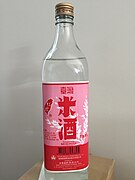Mijiu
This article needs additional citations for verification. (January 2017) |
cheongju |
Mijiu (
Mijiu is usually drunk warm, like the Japanese sake and Korean cheongju, and is also used in
A type of
: mǐ báijiǔ) is distilled from mijiu.An unfiltered form of Chinese rice wine containing whole glutinous rice grains of extremely low alcoholic content and often consumed by children is called jiǔniàng (酒酿) or láozāo (醪糟).
In Taiwan, the
Mijiu is commonly used in cooking dishes such as ginger duck, sesame oil chicken, and shochu chicken.[2]
Usage
The traditional way to use mijiu is to boil three bottles and evaporate the alcohol while cooking with the chicken. It is believed that by using this recipe one can help women's rehabilitation wound. Mijiu is also used in Jiuniang which is a dish that consists of the rice wine, rice particles, and sometimes glutinous rice balls. [3]
Dishes
Mijiu is used in Chinese desserts such as:
- Eggs spoiled in rice wine
- Sweet soup balls with rice wine
- Rice wine with brown sugar
Gallery
See also
- Huangjiu, another type of Chinese wine made from rice
- Rice baijiu, a distilled alcohol made from rice
- Jiuniang
- Sake, a Japanese equivalent
- Mirin
- Cheongju, a Korean equivalent
References
- ^ Carlson, Gordon S. (1981). The Rice Journal. Volumes 84-87. p. 263.
- ^ "紅標料理米酒". 台灣菸酒股份有限公司/Taiwan Tobacco & Liquor Corporation. 台灣菸酒股份有限公司/Taiwan Tobacco & Liquor Corporation. Retrieved 17 April 2016.
- ^ 太元, 查. "台湾红标米酒与WTO那些事". No. dfdaily.com. 查太元. dfdaily.com. Retrieved 18 April 2016.[permanent dead link]


